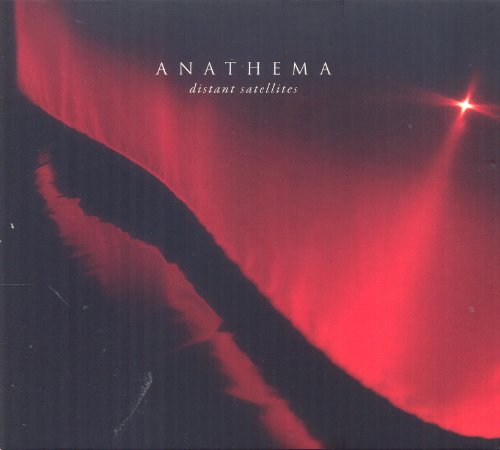
Anathema
Distant Satellites
Release Date: Jun 10, 2014
Genre(s): Electronic, Electronica, Pop/Rock, Neo-Prog, Prog-Rock
Record label: Kscope
Music Critic Score
How the Music Critic Score works
Buy Distant Satellites from Amazon
Album Review: Distant Satellites by Anathema
Excellent, Based on 8 Critics
Based on rating 5/5
Speculation has long been rife among Anathema fans about just why this extraordinarily consistent and powerful Liverpool band have yet to be embraced by the mainstream rock world: it seems bizarre that their soaring, emotionally overwhelming paeans to life, love and loss haven't elevated them to the arena circuit. A darker and more eccentric record than its predecessors, Distant Satellites may not be the album to change all that, but it's still another masterclass in supercharged emotional songwriting and fearless sonic curiosity. Vinnie Cavanagh and Lee Douglas's vocals combine and contrast exquisitely throughout, reaching an apex of tear-jerking majesty on The Lost Song Part 2 and the almost unbearably moving one-two of Anathema and You're Not Alone.
Based on rating 9/10
The path leading Anathema to Distant Satellites from Liverpool and their doom metal origins hasn't followed an obvious course, but it has been consistent. Each album since Eternity (even from the beginning, you might argue) has nudged the band a little deeper into new territory. The swirling atmospheres and emotions of their current dwelling place, and the progressive and art/alt rock structures of their songwriting, developed gradually at first, until it became clear that Anathema was finding its way home — or perhaps building a new one.
Based on rating 4/5
There’s a lushness to Anathema these days which oozes confidence, purpose, vision… the whole gamut. Their 10th album unequivocally crystallises this in such a way that it validates their journey from doom metal through gothic and into this stream of new progressiveness. Could this be the light that the brothers Cavanagh, the Douglas siblings and oddman- out Daniel Cardoso had fixed their telescopes upon? Distant satellites brought into the sharpest focus… The band might argue that they’ve stripped things back, claiming that “unless something really needs to be there, we’re not going to put it on”.
Based on rating 8/10
With each release since the mid-'90s, Anathema have pushed their boundaries to the breaking point, creating a prog pop sound of their own. After the groundbreaking -- and universally celebrated -- Weather Systems in 2012, it was fair to wonder just where else they could go. That question is answered with Distant Satellites. Produced once more by Christer-André Cederberg, the set is divided into two halves that diverge from one another musically but are lyrically united, reflecting the evolution of an encounter with love, death, grief, yearning, acceptance, transcendence, and spiritual transformation.
Based on rating 8/10
It seems like a long time ago now that Anathema abandoned their roots in the UK death/doom scene to embark on a more melodic path, one that has led to them becoming one of the country’s foremost purveyors of emotionally charged rock. Straddling the boundary between Floydian progressive rock, post-Radiohead art rock and (whisper it) post-Coldplay pop rock, Anathema’s two most recent efforts, 2010’s We’re Here Because We’re Here and 2012’s Weather Systems, have seen the group affirm just how comfortable they have become in their own skin. The bright skies that graced the covers of both those records were startlingly appropriate indicators of how far hope had come to inflect the mournful tones that had previously dominated Anathema’s discography.
Based on rating 3.7/5
Review Summary: Anathema are here because they're here and they're going to do what they know how to do.Anathema have been on a roll for over twenty years. Regardless of musical direction, they’ve managed to consistently release albums that were creative, emotional and fairly unique. Those three overarching facets seemed to peak with the release of We’re Here Because We’re Here.
Based on rating 6/10
With Coldplay now having jumped the shark, it is safe to say that anyone in the market for emotive, piano-driven rock ought to look to the bands that are now doing (and have been doing) the kind of stuff those weepy Brits have now stopped doing. There are numerous candidates that fit this bill; however, as it turns out, the goal of making anthemic, radio-dominating ballads, is not one for the faint of heart. Embrace, aided by Chris Martin himself, churned out a decent set of piano ballads in 2005’s Out of Nothing, but that failed to stick with the public in any major way.
Opinion: Fairly Good
Think of Liverpool's contribution to music and you could reel off the names of dozens of alumni who have ploughed the fields of pop culture so industriously that the subsequent crops have kept generations nourished and then some. One name you're unlikely to suggest, though, is Anathema. On their tenth studio album one detects almost hazardous levels of fertiliser, so lithe, muscular and burnished is the bulk of its contents.
'Distant Satellites'
is available now

